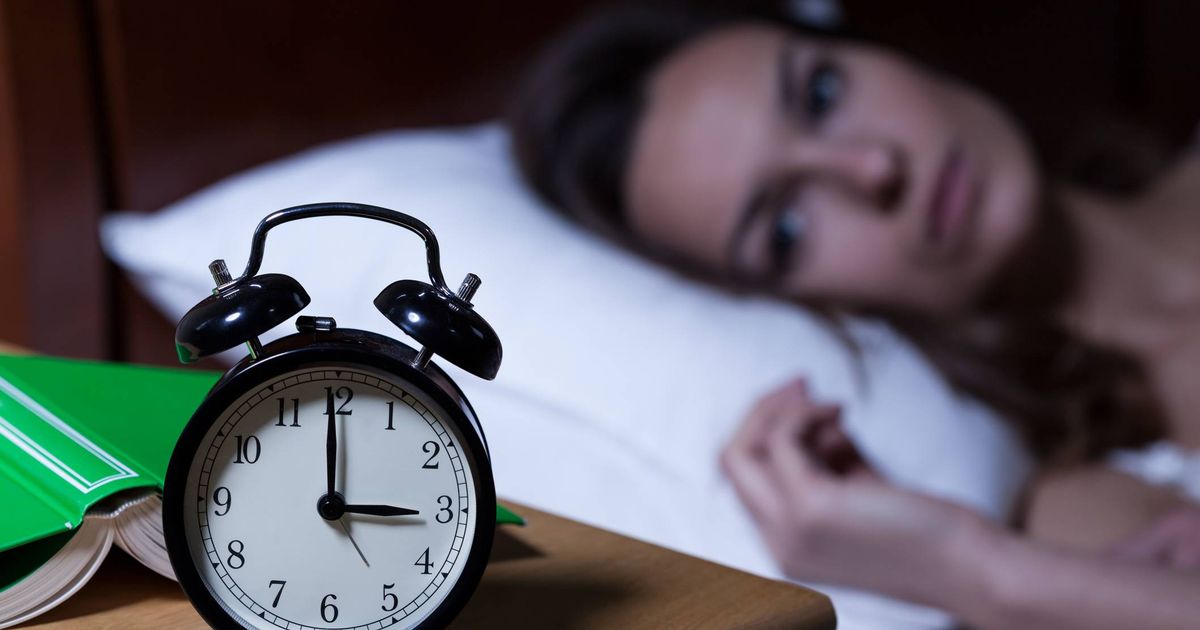Sleep deprivation can have a host of negative health effects
14:54, 05 Aug 2025Updated 14:58, 05 Aug 2025
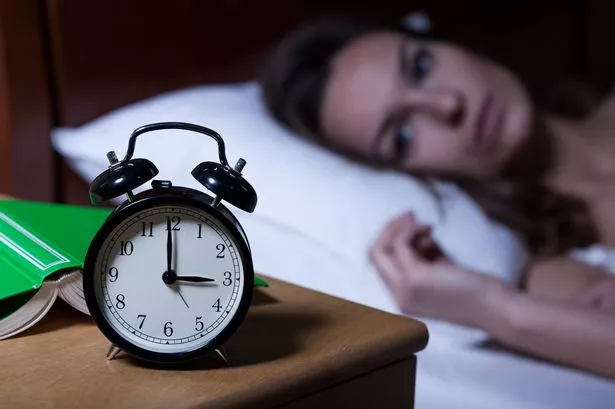 Menopause involves a significant drop in estrogen and progesterone levels, which are crucial for regulating sleep(Image: Getty)
Menopause involves a significant drop in estrogen and progesterone levels, which are crucial for regulating sleep(Image: Getty)
All over the globe, countless women in their 40s and 50s find themselves waking up between 2am and 4am for a common reason. The cause is linked to hormonal shifts as a result of menopause and perimenopause, which many women in these age ranges experience.
Menopause is a natural biological phenomenon marking the stage in a woman’s life when her menstrual cycles end due to reduced hormone levels, especially estrogen. It typically occurs naturally between the ages of 45 and 55, but can happen earlier or later for various reasons.
Perimenopause is the transitional period leading up to menopause, which can result in fluctuating hormone levels and irregular menstrual cycles. The primary symptoms of menopause and perimenopause include hot flushes, night sweats, sleep disturbances, mood swings, vaginal dryness, and changes in sexual desire.
Research from December 2024 reveals that about 75% of women experience troublesome menopause symptoms, such as hot flushes and night sweats, and 77% encounter issues with their sex drive. The study also found that two-thirds of women suffer from brain fog and sleep disturbances. For perimenopausal women, the data shows that over 40% report problems with sleep, reports the Mirror.
Despite nearly all women experiencing menopause, research indicates a significant lack of medical understanding about it. A 2024 survey of 157 members of the British Menopause Society revealed that 72% believe newly qualified healthcare professionals “have not been given enough education about menopause.” The same survey discovered that 55% think there is “insufficient evidence‐based education training for qualified healthcare professionals.”
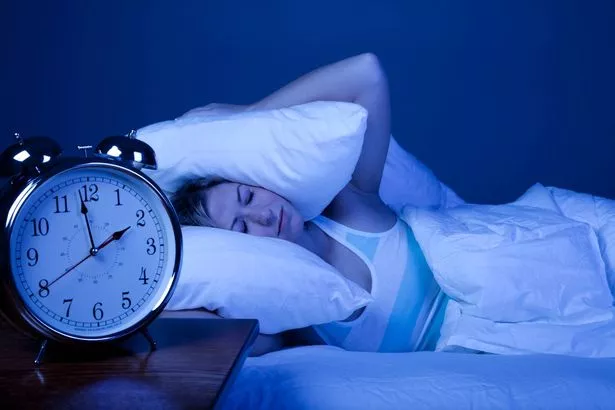 It’s common for women to experience early morning awakenings, often around 3am, as a symptom of menopause(Image: Getty)
It’s common for women to experience early morning awakenings, often around 3am, as a symptom of menopause(Image: Getty)
Several health experts have expressed their views on menopause and are encouraging people to speak up. Dr Lanny Wilson, MD, chair of the Physician Well-Being Program at UChicago AdventHealth Hospitals, stated: “It is important for women going through perimenopause or menopause not to be ashamed. We, as physicians, have to take the time to listen to patients and see what symptoms they’re experiencing because every transition is unique to every patient.”
Dr Butler, an OB-GYN and member of the AMA board of trustees, noted that perimenopause and menopause vary for each woman by 85%. Dr Faubion, MD, Director of Mayo Clinic Women’s Health, disclosed that her own research in 2023 found that some women’s careers have been negatively affected by menopause.
“A full 13% of the women we surveyed experienced an adverse work outcome related to menopause symptoms“, she said. “And about 11% were missing days of work because of these symptoms.” Lack of sleep can really cause a bunch of health issues, affecting both your body and mind. The consequences can include a weakened immune system, a higher chance of chronic illnesses, as well as problems with thinking and mood swings.
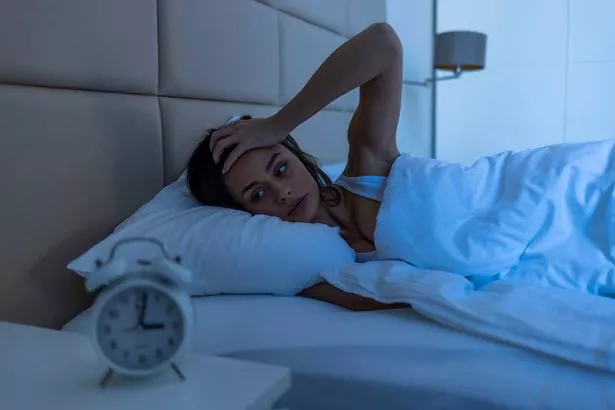 Lack of sleep can really cause a bunch of health issuesWhy 3am specifically?
Lack of sleep can really cause a bunch of health issuesWhy 3am specifically?
Research into our 24-hour body clock, known as the circadian rhythm, has revealed that cortisol levels naturally start to rise between 2am and 3am. If you’re already feeling stressed or anxious, this natural increase in cortisol could be the reason why you’re waking up at these early hours. It’s not uncommon for women, particularly those under chronic stress, to experience elevated nighttime cortisol. This can lead to wake-ups between 2am and 4am, making it difficult to fall back asleep.
During perimenopause, falling estrogen and progesterone levels disrupt thermal regulation and reduce serotonin and melatonin levels. This ultimately decreases the activity of GABA receptors – proteins that respond to the neurotransmitter gamma-aminobutyric acid, which is the main inhibitory neurotransmitter in the central nervous system.
As a result, dips in nighttime blood sugar can trigger spikes in cortisol, leading to a 29% increased likelihood of sleep disturbance and a 41.7% prevalence of insomnia.
What can women do to avoid waking up at 3am?
The NHS says: “Menopause and perimenopause symptoms can have a big impact on your life, including relationships and work. There are things you can do to help with symptoms. There are also medicines that can replace the missing hormones and help relieve your symptoms.”
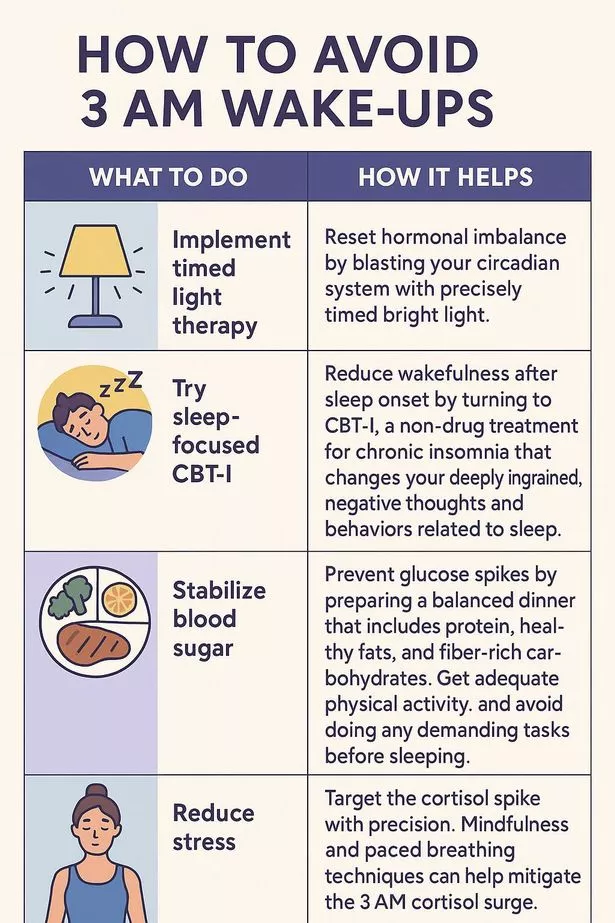 Following these simple steps could help women avoid sleepless nights (Image: Vanswe Fitness)
Following these simple steps could help women avoid sleepless nights (Image: Vanswe Fitness)
Eating a balanced dinner with protein, healthy fats, and fibre can help keep your blood sugar steady overnight. Try not to eat too close to bedtime so your digestion can work properly before you go to bed. Studies have suggested that kiwis might improve sleep quality and duration due to their serotonin content. Serotonin helps regulate the sleep-wake cycle and is a precursor to melatonin, the sleep hormone.
Magnesium is brilliant for relaxation and calming the nervous system. Be sure to include magnesium-rich foods like leafy greens, seeds, and nuts in your meals. If you need a bit more support, after consulting with your doctor and receiving their advice first, a magnesium supplement could be a viable option.
Tryptophan is an amino acid that aids your body in producing serotonin and melatonin, both of which are essential for a good night’s kip. Foods such as turkey, chicken, nuts, and seeds can help you achieve better rest. Certain foods can naturally boost melatonin levels. Consider incorporating goji berries, tart cherries, pistachios, and milk into your diet to enhance your body’s melatonin production.
Herbal teas like chamomile, lavender, and peppermint can be a soothing addition to your evening routine. Chamomile contains apigenin, which encourages sleepiness, while lavender is renowned for its relaxing properties. Peppermint tea is an excellent choice if you’re grappling with digestive issues that keep you awake.
If you find yourself wide awake at 3am, don’t resist it. Acknowledge that it might be a hormonal or stress-induced reaction. Deep breathing or mindfulness can aid you in relaxing and drifting back to sleep. Keeping a sleep diary or utilising a sleep-tracking app can help you identify patterns. This can offer you valuable insights into what might be impacting your sleep.
Both caffeine and alcohol are notorious for wreaking havoc on sleep patterns. Cut back on caffeine after midday, and avoid booze during evening hours to boost your odds of getting a proper night’s kip.
Getting your body moving regularly helps keep your sleep-wake rhythm in check, though when you exercise matters enormously. Hitting the gym too near bedtime can spike cortisol levels and mess with your ability to drop off. Aim to finish vigorous training sessions several hours before hitting the hay.
A spokesperson for Vanswe Fitness said: “As perimenopause quietly unsettles millions of women’s nights, the medical community’s blind spot has left many struggling alone. Yet understanding these hormonal shifts and demanding better menopause education for clinicians can transform care.
“By combining awareness with targeted strategies like timed light exposure, CBT‐I, balanced nutrition, and stress management, women can finally reclaim restful sleep. It’s time for patients and providers to recognise perimenopausal sleep disruption as a core symptom, not an afterthought, and work together to end this silent epidemic once and for all.”

